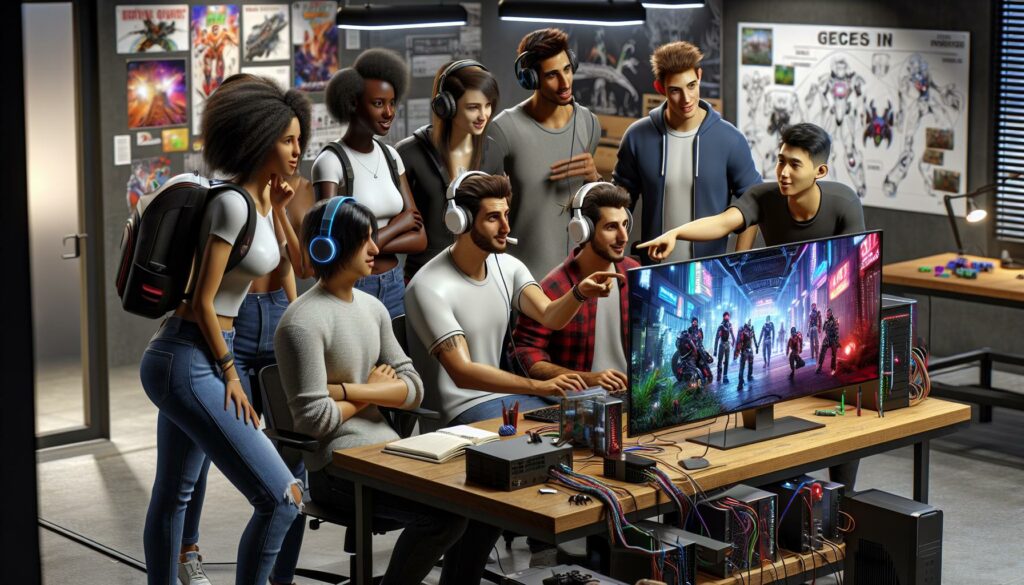In a world where gaming isn’t just a pastime but a thriving industry, pursuing a B Tech in gaming is like leveling up in real life. Imagine transforming a passion for video games into a rewarding career that pays the bills and gets you bragging rights at parties. Whether it’s developing the next blockbuster title or designing immersive virtual worlds, the opportunities are endless.
B Tech in Gaming
B Tech in gaming plays a critical role in shaping the future of the gaming industry. This degree emphasizes essential skills such as game design, programming, and graphics development. Students gain hands-on experience through projects that connect them to real-world scenarios.
Curricula typically include courses on artificial intelligence, 3D modeling, and interactive media. Expert instructors bring industry experience, providing insights that benefit aspiring game developers. Students often collaborate on team projects, simulating the dynamics of a real gaming studio.
Career prospects are diverse and lucrative. Graduates frequently pursue roles in game development, quality assurance, and project management. Data from the Entertainment Software Association indicates that employment in the gaming sector continues to grow, with an estimated 93 billion dollars in revenue generated in 2021 alone.
Networking opportunities abound during the program. Attend conferences, participate in workshops, and engage with industry professionals to expand connections. These interactions often lead to internships or job placement upon graduation.
B Tech in gaming equips students with both technical and creative skills. The unique blend of disciplines prepares graduates for various challenges in a competitive landscape. Investing in this educational path aligns passion for gaming with valuable, marketable skills that industry employers seek.
Educational Structure

The educational structure of a B Tech in gaming offers students a comprehensive understanding of the field. Students delve into various subjects that build their skills and knowledge relevant to the gaming industry.
Core Subjects
Core subjects include game design, programming, and graphics development. These foundational courses equip students with essential skills needed for success in gaming. In addition, artificial intelligence introduces concepts that enhance gameplay. Learning 3D modeling allows for the creation of immersive environments. Interactive media focuses on user experience and engagement. Together, these subjects foster a well-rounded understanding of the technical aspects of gaming.
Elective Courses
Elective courses enrich the educational experience for students pursuing a B Tech in gaming. Options might include mobile game development or virtual reality design. Specialized topics such as game psychology provide insights into player behavior. Courses on game marketing prepare students for effectively promoting their creations. Additionally, multimedia storytelling enhances narrative techniques within games. These electives enable students to tailor their education to their career aspirations, ensuring a personalized and relevant academic journey.
Career Opportunities

A B Tech in gaming opens doors to various career paths in the thriving gaming industry. Graduates of this program possess a blend of technical and creative skills, making them valuable assets in numerous roles.
Game Development
Within game development, professionals turn concepts into playable experiences. Roles such as game programmer, gameplay engineer, and technical designer focus on building gameplay mechanics and features. Students with a background in programming languages, game engines, and software development thrive in these positions. Using tools like Unity or Unreal Engine, they create immersive worlds and engaging narratives. Often, developers collaborate closely with designers and artists to ensure the final product meets both technical standards and creative vision.
Game Design
In the realm of game design, creativity and technical know-how are essential. Game designers craft the rules, storylines, characters, and environments that captivate players. Their responsibilities include creating prototypes, scripting events, and balancing gameplay systems. Skills in user experience, art direction, and storytelling enhance their ability to produce engaging content. Designers often work alongside programmers and artists, ensuring all elements cohesively contribute to the player experience. This collaboration fosters innovation, leading to unique gaming experiences that resonate with audiences.
Skills Acquired Through B Tech in Gaming

A B Tech in gaming cultivates a diverse skill set tailored for the gaming industry. Students develop both technical and soft skills, positioning them for success in various roles.
Technical Skills
Programming forms the backbone of gaming development. Students learn languages like C++, C#, and Python essential for creating robust gaming applications. Game design principles guide the crafting of engaging user experiences. Knowledge in software tools such as Unity and Unreal Engine allows graduates to build immersive virtual environments. Graphics development encompasses 3D modeling and animation, enabling the creation of visually stunning game assets. Mastery of artificial intelligence algorithms facilitates the development of intelligent non-player characters. These technical skills ensure graduates are equipped for careers in game development, simulation, and quality assurance.
Soft Skills
Communication skills play a vital role in teamwork and project collaboration. Students enhance their ability to articulate ideas clearly, fostering effective discussions among peers and instructors. Problem-solving skills emerge from tackling complex design challenges and debugging code. Adaptability is crucial in the fast-paced gaming industry, allowing individuals to embrace new technologies and trends. Creativity fuels innovation, encouraging graduates to brainstorm fresh game concepts and mechanics. Time management skills enable students to juggle multiple projects and deadlines efficiently. Overall, these soft skills complement technical expertise, making graduates well-rounded professionals ready to thrive in diverse gaming careers.
Industry Trends
The gaming industry constantly evolves, influenced by emerging technologies and job market trends. Understanding these aspects proves crucial for aspiring professionals in this field.
Emerging Technologies
Developers increasingly utilize virtual reality and augmented reality to create immersive gaming experiences. Artificial intelligence significantly enhances gameplay, with the ability to generate dynamic narratives and intelligent non-player characters. Blockchain technology introduces unique ownership models, like non-fungible tokens, allowing players to buy, sell, and trade in-game assets. Additionally, cloud gaming platforms enable seamless access to high-quality games across devices. Advancements in graphics engines also contribute to visually stunning environments that draw players in.
Job Market Outlook
The job market for gaming professionals remains robust, reflecting the industry’s growth. Demand for skilled developers, designers, and project managers continues to rise. Game developers contribute significantly to this expanding field, with positions in mobile game development and eSports management becoming increasingly popular. The U.S. Bureau of Labor Statistics projects a 22% job increase for software developers from 2020 to 2030. Graduates from B Tech in gaming programs find themselves well-positioned for diverse roles, as employers seek candidates with a blend of technical expertise and creativity. Networking during coursework enhances chances for internships and job placements, leading to promising career paths in various gaming sectors.
A B Tech in gaming not only transforms a passion into a rewarding career but also equips graduates with essential skills for a rapidly evolving industry. The combination of technical know-how and creative prowess enables them to thrive in various roles, from game development to project management.
As the gaming landscape continues to expand with emerging technologies, the demand for skilled professionals remains high. Graduates are well-prepared to meet industry challenges and seize opportunities that arise. With a solid foundation and hands-on experience, they’re ready to make their mark in the dynamic world of gaming.

